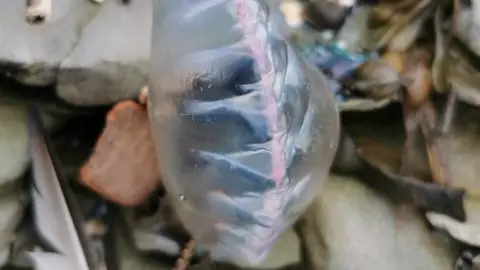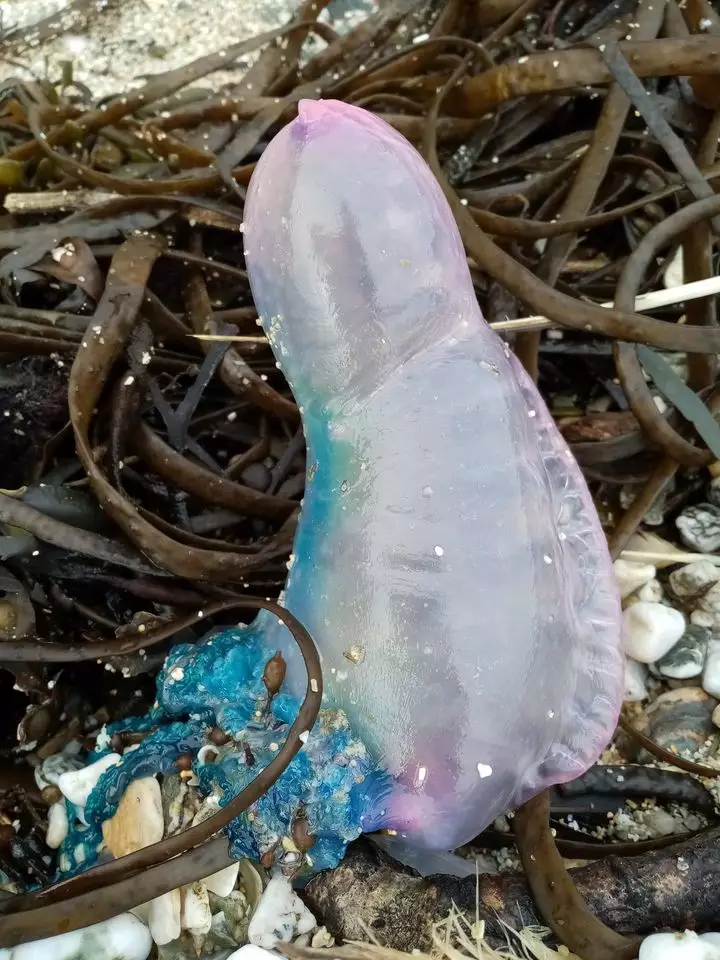
Hundreds of Portuguese men o' war have washed up on beaches in Cornwall. You can see for yourself here:
This is notable for two key reasons, which you should be able to deduce from the name Portuguese man o' war: they ain't typically found around these parts, and they're frightening b******s.
Advert
The 'floating terror' (which is an even more intimidating moniker) has been spotted mainly on the south coast, at the likes of Gyllyngvase Beach and Maenporth Beach at Falmouth, Loe Bar near Porthleven, and Hannafore Beach and Porthkidney Beach near St Ives.
On Sunday, about 40 were sighted on Gunwalloe beach on the Lizard peninsula, while the most recent sighting was reported yesterday (Tuesday 10 November), when Rachel Clarke of Falmouth counted 13 on Castle Beach.
The chances are you don't know a great deal about Portuguese men o' war, other than that they're a kind of venomous jellyfish. However, even this is only half right, as the Marine Strandings Network explained in a Facebook post, which quite frankly makes me feel a bit ill.

The post reads: "PORTUGUESE MAN O' WAR SIGHTINGS! We have had numerous reports of Portuguese Man o' War (Physalia physalis) strandings taking place across Cornwall, brought in by the recent winds and weather.
Advert
"These intriguing creatures are NOT jellyfish, but are actually a colony of individual polyps dependent on each other for survival. The distinctive purple gas-filled float, the pneumatophore, acts as a sail which helps to float the rest of the colony across the surface of the water.
"The tentacles can hang down for several meters, secreting digestive juices onto prey which has been caught and immobilised by the debilitating sting delivered from the specialised stinging cells.
"If you do happen to come across any of these fascinating creatures, please make sure you do not touch and only admire from a distance."
To be honest, words such as 'polyps', 'tentacles' and 'secreting digestive juices' haven't exactly got me feeling particularly tactile.
In all seriousness though, you really shouldn't touch them. They have a powerful sting that can cause an anaphylactic shock and can even be fatal, though typically the sting is just excruciatingly painful.
Advert
Should you get stung by one, the Cornish Wildlife Trust advises that you take on board the following advice: "Recommended treatment for man-of-war stings includes immediate removal of the tentacles with tweezers and rubber gloves by washing in saltwater first, but don't rub the area as this makes the sting worse.
"Some find that immersion of the affected areas in warm fresh water for 20 minutes helps, as does the application of an ice pack to the stings, but under no circumstance should vinegar be used on stings from this animal as this can make them worse."
Those of you lucky enough to have a dog and live near a beach in Cornwall should also keep an eye out for the washed up polyp colonies, as they could do serious harm to your pooch.
Featured Image Credit: Cornwall Live/BPM